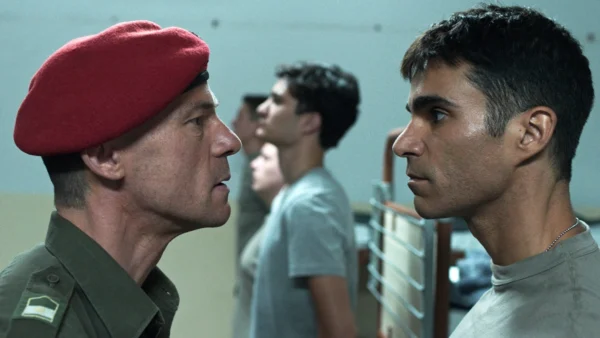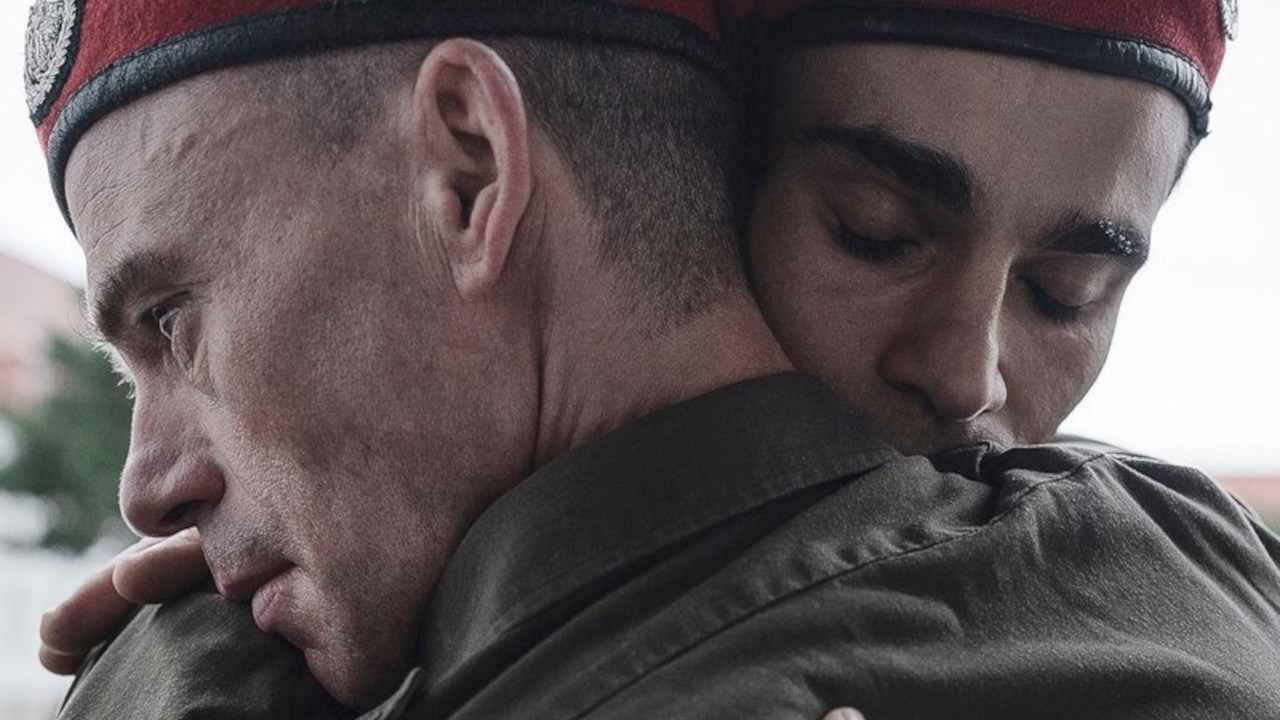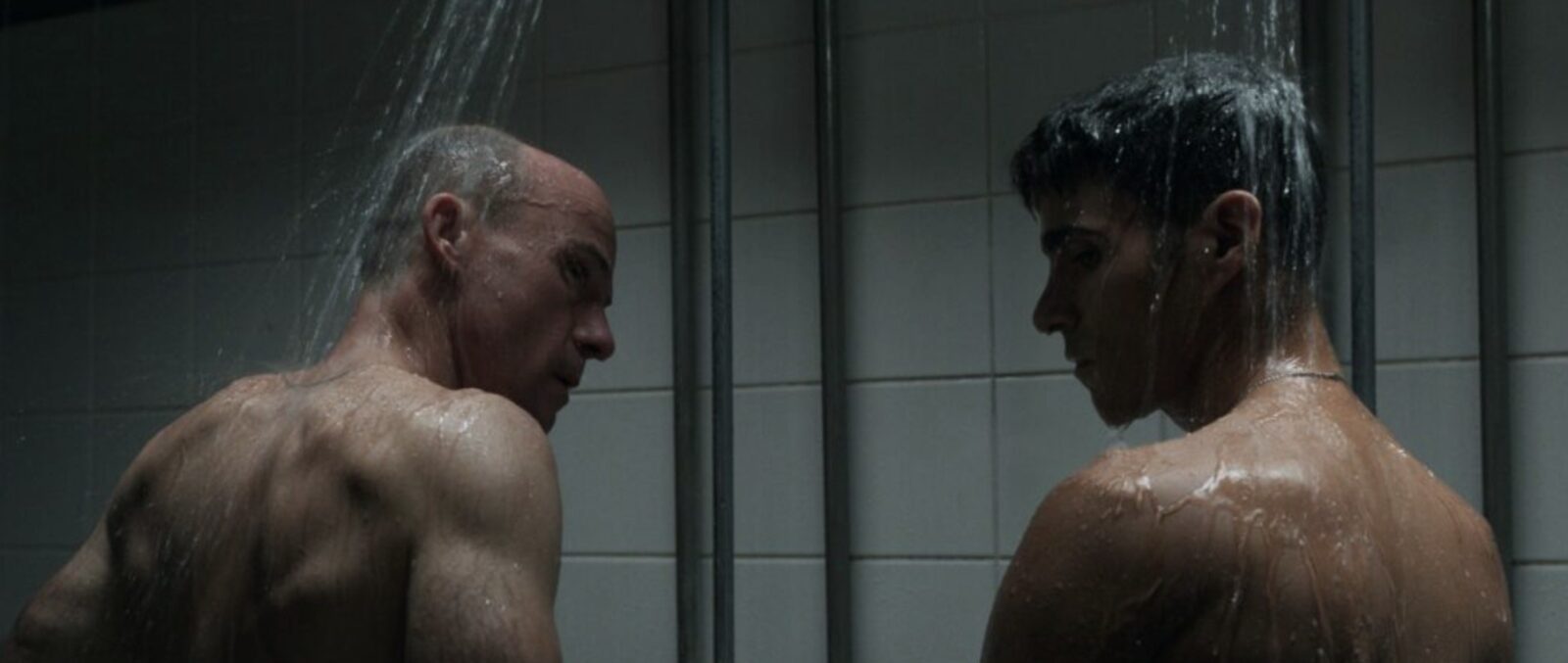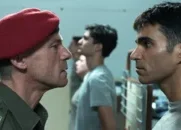
The film begins with a lament, it is winter in Central Europe, and the camera moves out from a ruined landscape to a forest, this sadly beautiful shot repeats for a while and it is interesting to wonder how it refers to the story we are about to view.
 Indoors at a military center, young white men lined up are asked for their names, each one says his surname loudly, among all, the most outstanding is Bosnian Mario Falak. They are all recruiting for a six tough months period at the cream of the crop, The Fourth Guards Company of the Austrian Army where Charles Eismayer is in charge as Sergeant Major, a hard man with an iron fist that loves discipline and to command. In some sequences of the movie, there is a fair reminder of him in relation to the authoritarian Sergeant Hartman (Stanely Kubrick´s Full Metal Jacket)
Indoors at a military center, young white men lined up are asked for their names, each one says his surname loudly, among all, the most outstanding is Bosnian Mario Falak. They are all recruiting for a six tough months period at the cream of the crop, The Fourth Guards Company of the Austrian Army where Charles Eismayer is in charge as Sergeant Major, a hard man with an iron fist that loves discipline and to command. In some sequences of the movie, there is a fair reminder of him in relation to the authoritarian Sergeant Hartman (Stanely Kubrick´s Full Metal Jacket)
Several days after, the group of young recruits and their superiors visit the Seetal Alps training area, we learn young Falak is an openly gay man. In a meal, one of the superior commanders says the army is no place for fags, and makes a strange comparison that has resonances: it would be like putting a pedophile into a kindergarten…

In another sequence Charles arrives home where his wife and son are waiting for him, his son brings him joy, but there is no fluid communication between the couple. Instead, the husband prefers to stay at the barracks. We become aware he is a repressed man, who even smokes when taking a shower, and he also coughs constantly.
Charles has a secret. He has been conscious of being gay since his childhood, back then his mother told him: just don’t talk about it, it will pass. The father never looked him in the eyes again; both parents agreed on sending him to the military, to make a man out of him. In this context, it makes sense what has been said above about the kindergarten related to the military academy… and the narrow mentality of the men with power that has been inherited for generations up to date.
The film shows individuals as they are in the present time we are living. Masculine Mario has a complete acceptance of his sexuality and his authenticity makes him appealing to his pals in the barracks, they like him as he is. Sergeant Eismayer is in a different position, masculinity is his armor, and he struggles with his inner demons, lying to his wife and also dealing with sickness. He is a tender man and has a heart, but also he is the authority that instructs and imposes.
 For one reason or the other, there is little gossip about the men and their personal appetites, the movie does not show classic bullying, on the contrary, both men are accepted and respected as homosexuals, and this contemporary turn makes the difference with other narratives on the topic.
For one reason or the other, there is little gossip about the men and their personal appetites, the movie does not show classic bullying, on the contrary, both men are accepted and respected as homosexuals, and this contemporary turn makes the difference with other narratives on the topic.
At the end of the six-month period of recruitment, Mario and Charles are in love with each other and some things are resolved. Mario has been accepted into the military academy to become an officer.
Time goes by… to write history. On January 31st, 2014 Eismayer and Falad officially entered a civil union at the Maria-Theresien –Kaserne, Army Barracks in Austria, and both were still on active duty at the end of filming.
Excellent direction by David Wagner, and acting by Gerhard Liebmann as Charles and Luka Dimic as Mario.
The film based on true events received the Audience Choice Prize and the Film Nuts´Award at Les Arcs European Film Festival 2022, Premiered at Venice Film Festival 2022, received the International Critic´s Week Grand Prize Venice, and was nominated for the Queer Lion.
Review by José Mayorga , Guatemala, Central America lawyer and notary public, visual artist, and editor of El Azar Cultural, lives and works in Guatemala City. Cinema lover, curious about the possibilities life brings and eager to live the experience.


Comments
2 responses to “Queerguru’s José Mayorga reviews EISMAYER a compelling military queer love story based on real life”
Can this movie be purchased
Ask https://eismayer.com/